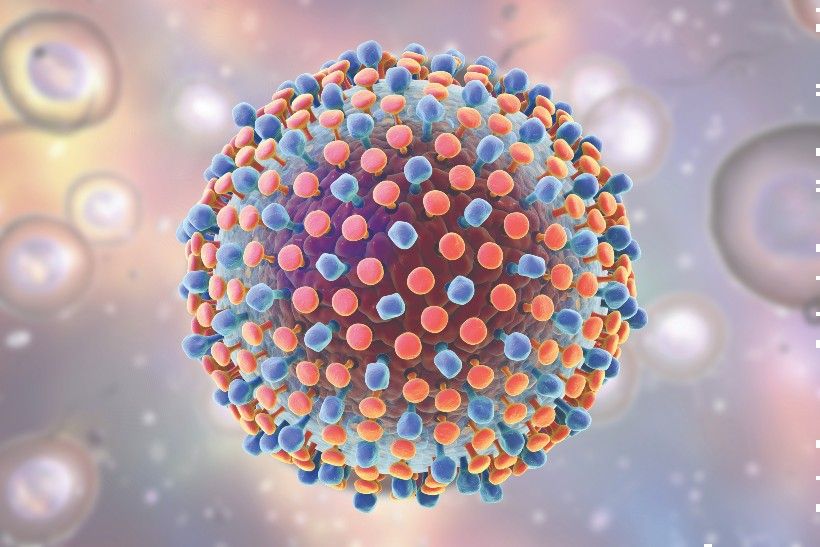
At the Liver meeting, Barinthus Biotherapeutics (formerly Vaccitech) presented data from a study examining its immune drug candidate VTP-300 in combination with Arbutus Biopharma’s investigational hepatitis B treatment imdusiran.Researchers found that the combination of imdusiran and VTP-300 significantly reduced hepatitis B surface antigen (HBsAg) levels remain well below baseline.
“Imdusiran has consistently delivered compelling efficacy and safety data across multiple Phase 2a populations and combinations. In this trial, all but 1 patient achieved surface antigen levels below 100 IU/mL, One patient achieved this after only 24 weeks of treatment with educilane plus NUC
VTP-300 consists of an initial dose using the ChAdOx vector and a secondary dose using the MVA vector platform, both encoding multiple hepatitis B antigens, including full-length surface, modified polymerase and core antigens. VTP-300 is the first antigen-specific immunotherapy that has been shown to induce sustained reductions in HBsAg.
Imdusiran is an RNA interference (RNAi) therapeutic specifically designed to reduce all HBV viral proteins and antigens, including hepatitis B surface antigen. This is thought to be a key prerequisite for reawakening a patient’s immune system to deal with the virus. Imdusiran uses Arbutus’ novel covalently conjugated N-acetylgalactosamine (GalNAc) delivery technology to target hepatocytes for subcutaneous delivery. Clinical data generated to date indicate that single and multiple doses of imdusiran are generally safe and well tolerated while also significantly reducing hepatitis B surface antigen and hepatitis B DNA. Imdusiran is currently undergoing multiple Phase 2a clinical trials.
what you should know
Combination treatment with imdusiran and VTP-300 demonstrated a substantial reduction in HBsAg levels during imdusiran treatment.
Studies have shown that combination therapy maintains meaningful reductions in HBsAg levels well below baseline. Notably, 97% of imdusiran-treated patients had HBsAg levels below 100 IU/mL at the time of first dose of VTP-300/placebo.
VTP-300 is described as the first antigen-specific immunotherapy to demonstrate sustained HBsAg reduction. Additionally, preliminary immunologic data demonstrated enhanced HBV-specific T cell interferon gamma (IFN-γ) production in patients receiving imdusiran plus VTP-300 compared with placebo.
Research details
Researchers recruited 40 noncirrhotic, virally suppressed chronic hepatitis B (CHB) patients receiving stable NUC therapy. Patients initially received educilan (60 mg every 8 weeks) for 24 weeks and then were randomized to receive VTP-300 or placebo at weeks 26 and 30 (if HBsAg fell >0.5 log10 between weeks 26, then conditionally received treatment at weeks 38) and 34), as well as ongoing NUC treatment. Preliminary data include the subset of patients who received the 2-dose VTP-300 regimen (28/40 patients) and follow-up data available at week 48 (12/40 patients), and show the following data:
- A reduction in HBsAg was observed during imdusiran treatment (mean reduction from baseline after 24 weeks of treatment -1.86 log10). The decrease in HBsAg was comparable to the decrease in imducilam in other clinical trials conducted to date.
- At the first dose of VTP-300/placebo, 97% of imdusiran-treated patients (33/34) had HBsAg <100 IU/mL.
- VTP-300 treatment appeared to help maintain low HBsAg levels early after treatment, as mean HBsAg levels in the placebo group began to increase approximately 12 weeks after the last dose of imdusiran.
- All VTP-300-treated patients maintained HBsAg <100 IU/mL at week 48, 60% maintained HBsAg <10 IU/mL, and all were eligible to discontinue NUC treatment.
- Preliminary immunologic data indicate enhanced HBV-specific T cell IFN-γ production in patients treated with imdusiran plus VTP-300 compared with placebo.
Preliminary safety data from the trial indicate that imdusiran and VTP-300 were generally well tolerated. There were no serious adverse events, grade 3 or 4 adverse events, or treatment interruptions.
“As we continue dosing and following these patients, I look forward to seeing the potential of imdusiran, VTP-300 and NUC therapies to achieve functional cure in patients with CHB,” Sims said in the same statement.
refer to
The HBV003 trial and the Phase 2a AB-729-202 trial in patients with chronic hepatitis B are being conducted at AASLD in collaboration with Arbutus Biopharma. Barinthus Biotherapeutics Press Release. November 9, 2023.
https://investors.barinthusbio.com/news-releases/news-release-details/barinthus-bio-presents-interim-data-phase-2b-hbv003-Trial-and
